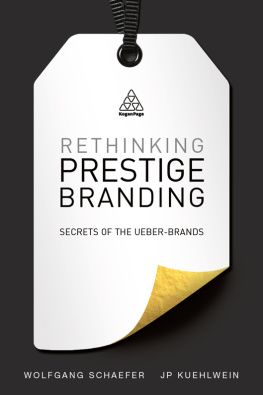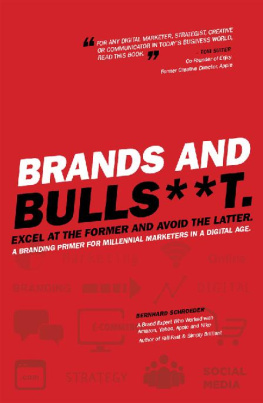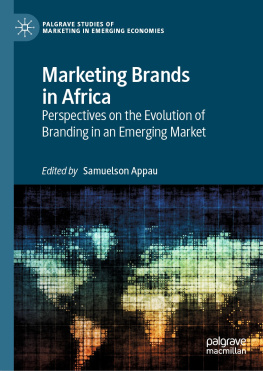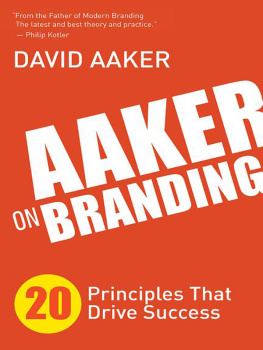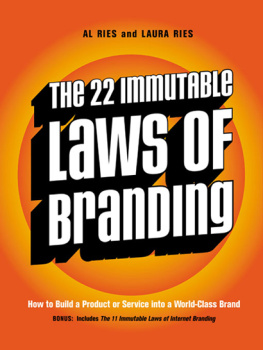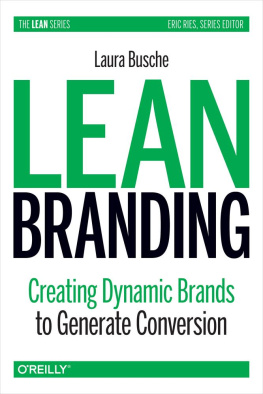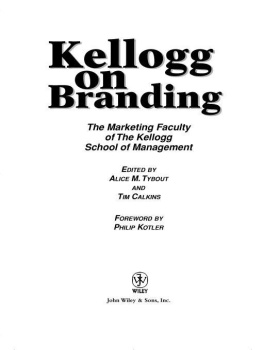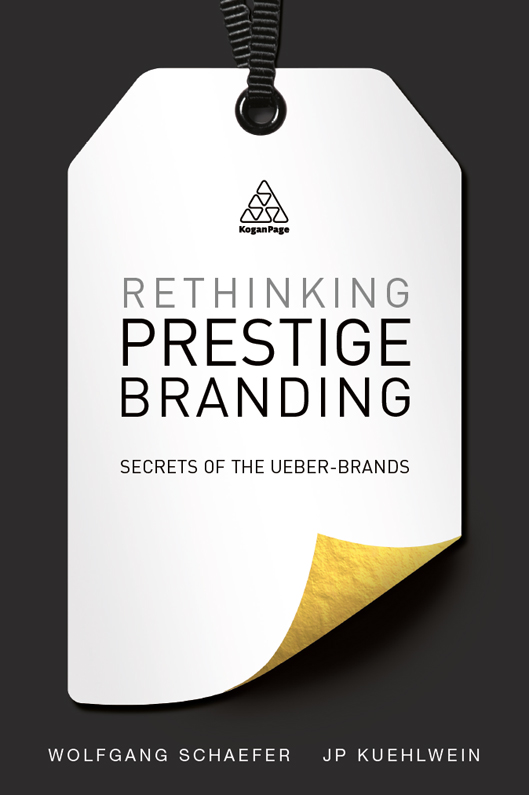
PRAISE FOR RETHINKING PRESTIGE BRANDING
This is one of the best books to come out in recent years on the changes and elevations of branding in marketing and society today, through to their mythic aspects. Bravo! Professor Robert Kozinets, Schulich School of Business, York University, Toronto
Rethinking Prestige Branding describes in an entertaining way todays marketing paradigm of prestige and luxury brands. Its an absolute must-read for any marketer working within the prestige or luxury industries. Atissa Tadjadod, Director Global Communications, Piaget (Richemont International)
I was fascinated by the authors approach, and highly encourage you to read this book. Dr G Clotaire Rapaille, author of The Culture Code , and Founder-CEO, Archetype Discoveries Worldwide
This book made me reflect on the Moleskine brand in a radically different way. There is much to learn from its innovative approach. Maria Sebregondi, Co-founder, Moleskine
This book sets a clear compass, balancing the mystery of magic and distance with the importance of purpose, meaning and customer delivery. Jenny Ashmore, President, Chartered Institute of Marketing (CIM), UK
To escape price competition there are not many routes: one can adopt the luxury strategy Another one, seemingly related yet different, is to build brands that endow their buyers with prestige in the eyes of their tribe based on an extensive benchmarking this book unveils the seven major clues explaining the success of these brands. This is a much welcome book for all marketing VPs. Professor Jean-Nol Kapferer, HEC Paris, author of The Luxury Strategy , Kapferer on Luxury and The New Strategic Brand Management
Thoughtful and probing, the authors expertly delve into the marketing alchemy of Ueber-Brands beyond superficial catchphrases and generic notions. A fresh and comprehensive work. Definitely worth the read. Deryck J van Rensburg, President, Global Ventures, The Coca-Cola Company
Schaefer and Kuehlwein find the rules of luxury have changed once again. This book is a great read for managers charged with building and maintaining prestige brands. Professor Scott Galloway, NYU Stern, Founder of Red Envelope and L2
An essential and timely meditation on the nature of brands, luxury, and the relationship between ownership and identity. The authors have given us a book that reflects deeply on the interconnectedness of material culture and the most ethereal aspects of human nature. An unlikely and very rewarding investigation into core human values. Dr David LaRocca, director of documentary Brunello Cucinelli: A new philosophy of clothes , author of Emersons English Traits and the Natural History of Metaphor
Rethinking Prestige Branding is very timely. In a rapidly changing world where prestige brands are facing explosive growth and incredible challenges, Wolfgang and JP provide a framework to understand and develop Ueber-Brands. Professor Srinivas K Reddy, Academic Director, LVMH-SMU Asia Luxury Brand Research Initiative, Singapore Management University
A thoroughly enjoyable read. The well researched and insightful principles provide a new framework to define prestige branding in the socially connected landscape. And in a world where creating an aspiration brand is more about high values than high value and demands a connection to the consumers mindset versus their wallet. John Goodwin, Chief Financial Officer and Executive Vice President, Business Enabling, LEGO
Rethinking Prestige Branding provides a thorough understanding of the often paradoxical rules for successful premium brand management. This book presents a complete and information-packed resource covering every aspect of this mythical sector. Professor Christiane Beyerhaus, Program Director, Global Brand and Fashion Management, International School of Management, Germany
A compelling, enlightening and fascinating translation of the language of luxury. The authors have thoughtfully analysed and carefully defined a subject matter that has been overlooked in its significance to culture and contribution to innovation. Gwen L Whiting and Lindsey J Boyd, Co-Founders, The Laundress
I enjoyed reading the book because the authors do not restrict themselves to luxury brands but explain concepts from multiple and varied industries. They have chosen carefully companies which are not only well-known but are making news in their respective industries and categories. Professor Ashok Som, Founding Director, ESSEC-IIMA Global Management Program on Luxury and Retail
You have to be able to make your customer dream and love your product . The authors help professionals and people who are about our industry to dig in some of its secrets. Christian Foddis, Managing Director, Greater China, Salvatore Ferragamo
As these authors demonstrate, anyone can be everything to everyone but to become a seductive Ueber-Brand, nothing is as volatile as a dream. Patrick Hanlon, CEO, Thinktopia, author of The Social Code and Primal Branding
With this book and the Ueber-Brand concept we are all stimulated to put a new energy to our brands as conditions for success in the contemporary world. Easy reading and not only academic but rich with real examples of success. Fabrizio Penta de Peppo, Professor of Luxury Marketing Management, Instituto Europeo di Design

Note on the Ebook Edition
For an optimal reading experience, please view large tables and figures in landscape mode.
This ebook published in 2015 by
Kogan Page Limited
2nd Floor, 45 Gee Street
London EC1V 3RS
United Kingdom
www.koganpage.com
Wolfgang Schaefer and JP Kuehlwein, 2015
E-ISBN 978 0 7494 7004 3
CONTENTS
I t all started with a glass of beer and a simple observation: some brands have gained almost mythical status seemingly beyond any price or performance considerations.
We had been working with each other for a while, JP as Brand Director for Procter & Gamble, the consumer goods behemoth, I as Chief Strategy Officer for SelectNY, a renowned global brand and communication agency. We were having an after work drink when one of our bar mates cut through our conversation, ordering a Supercharger (aka Vodka Red Bull), triggering a spiral of questions: Why do people flock to a gourmet vodka like Grey Goose, where vodka is mostly liked for being flavour neutral? What keeps Red Bull cool after all those years? And isnt the mystery around taurine, its famous ingredient, eerily similar to that of skin care brand Crme de la Mers miracle broth? Such different brands with different targets at vastly different price points, but both applying similar strategies and demanding a significant premium in their respective categories
Both of us have extensive experience with branding ranging from the mass to class tier and across many categories. We had discussed the differences many times, but somehow this time we got into a heated debate, raising question after question culminating in the ultimate: what makes a brand prestige in the 21st century?
The deeper we dug, the clearer it became that the answers arent as simple anymore. Prestige is accrued in many more ways than it used to be. Its marketing rules are in flux. And, perhaps most importantly, it is flourishing these days across pretty much all tiers and categories from a US $2 soft drink to multi-million dollar jewellery. Just like we all have come to blend designer with high street in our daily outfits, so are marketers growing more and more inclusive in their ways to exclusivity. Classic notions are shattered and reshuffled. Which is why we quickly felt uncomfortable using the established terminology and started talking about modern prestige or finally Ueber-Brands. Because this newly emerging breed of prestige brands thrives on paradoxes, breaks with branding traditions and inspires us with an innate sense of mission paired with often very counter-intuitive commercialization strategies. They understand that purpose beats performance and that price is often rather a catalyst than a barrier to purchase. Theyve taken the insight to heart, that the best way to sell is often not to sell and that function can be really emotional if you wrap it in a story. They know that devotion needs distance, but they know also that both are built differently in the digital age. They appreciate that slow can be fast and small is often much bigger, that it takes true dedication to instil the same in others and, above all, that marketing must be much more mythical if you want to become a brand of such proportions. In one word, they are Ueber above and beyond their competition not only in standing and their ability to make their price premium an afterthought, but mostly in courage and conviction. Perhaps (hopefully) they will lead the way into a new kind of marketing for the new millennium.
Next page
